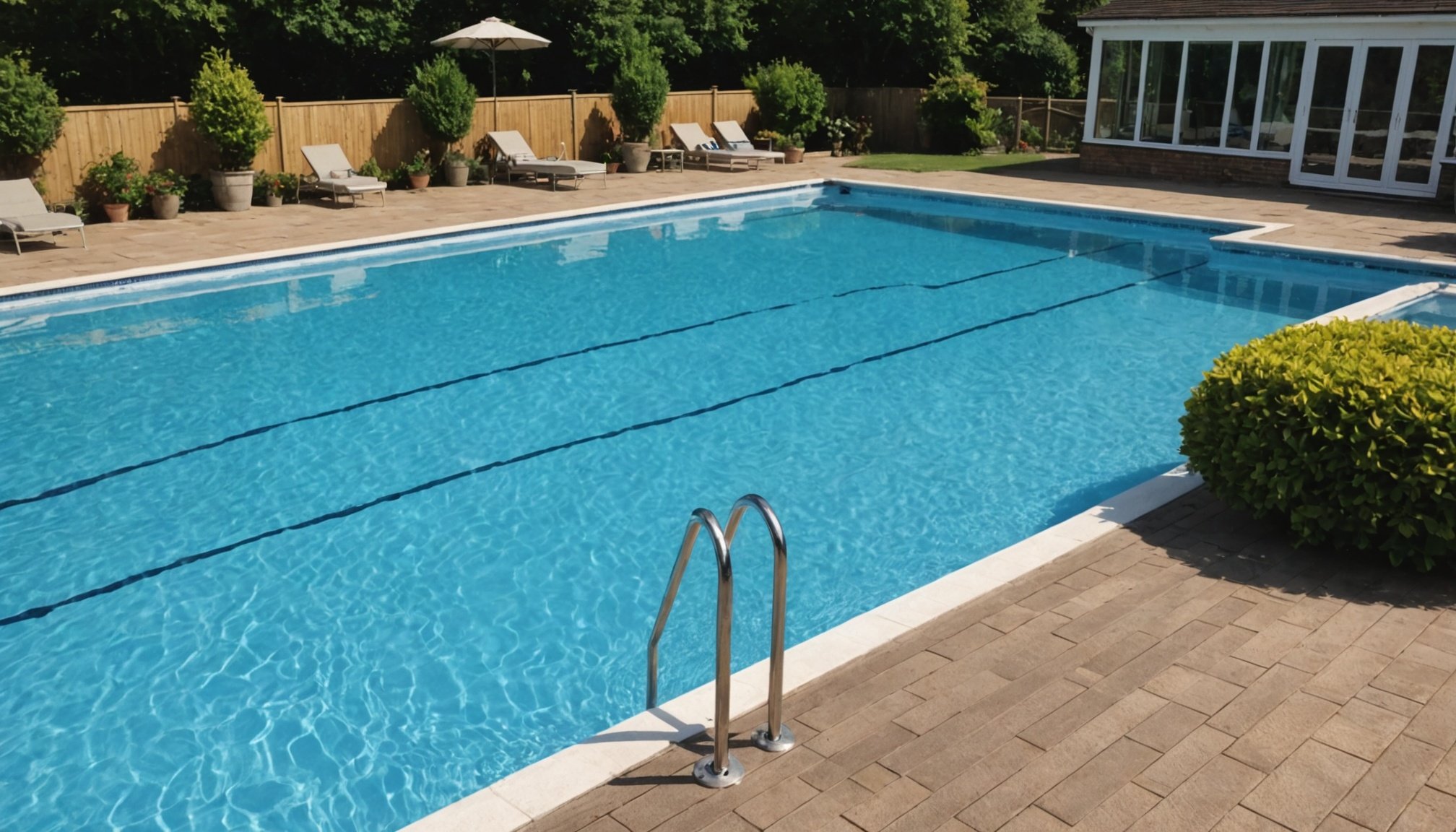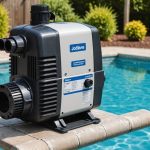Importance of Shutdown Maintenance for UK Swimming Pools
Understanding the risks associated with extended pool inactivity is crucial for UK pool owners. When a pool is inactive for a prolonged period, issues such as algae growth, water contamination, and structural damage can arise. Consequently, poor UK swimming pool care can lead to long-term expenses.
The UK climate poses specific challenges for pool preservation. With frequent rainfall and varying temperatures, pools may experience conditions that favour algae and bacteria proliferation. Thus, effective pool maintenance during shutdowns is essential to prevent water quality deterioration.
Topic to read : Uncover the benefits of a variable speed pump for your uk backyard pool
Neglect during long-term shutdowns can result in costly consequences. If pool maintenance is overlooked, debris accumulation, plumbing issues, and equipment breakdowns can occur. This can lead to expensive repairs or even the need for pool replacement.
In summary, the importance of pool protection cannot be overstated. By proactively maintaining UK swimming pools, including regular cleaning and monitoring water chemistry, pool owners can ensure their assets are safeguarded during shutdowns. This vigilance helps avoid unnecessary expenses and maintains a healthy pool environment, ready to be enjoyed once again when the time comes.
Also to read : Essential materials for building a durable and safe pool ladder in the uk
Cleaning Protocols Before Shutdown
Implementing a pre-shutdown checklist is imperative to ensure your pool remains in optimal condition during dormancy. Begin by executing a comprehensive cleaning routine. Start by skimming the pool’s surface to eliminate any foreign objects such as leaves and insects. It’s equally essential to brush and vacuum the pool sides and floor to prevent the build-up of algae or dirt—aggravating factors during shutdowns.
Removing debris is crucial not only for visual appeal but also to prevent damage. Organic matter can lead to staining or, worse, clogging the pool’s filtration and plumbing systems. Therefore, check and empty skimmer and pump baskets consistently.
After cleaning, inspect the pool structure and associated equipment for any existing issues. Addressing any cracks, leaks, or equipment malfunctions preemptively avoids exacerbation during inactivity. This proactive pool maintenance tip saves you from costly repairs and ensures a smoother reactivation process later on.
Incorporating these steps not only secures your pool during its inactive period but also aligns with effective pool maintenance during shutdowns, safeguarding your investment against unnecessary deterioration. Regular attention mitigates potential hazards and fortifies UK swimming pool care.
Covering Your Pool Effectively
Ensuring pool covering options are suitable for UK winters is vital for pool preservation. The harsh weather, characterized by rain and fluctuating temperatures, demands robust coverage. Choosing the best pool covers can mitigate the risk of debris accumulation and protect your pool during dormancy. Key options include solid covers, which block sunlight thereby preventing algae growth, and mesh covers, which allow water drainage while keeping out larger debris.
Proper installation is essential. To effectively protect your pool during winter, ensure the pool cover is securely fastened. This prevents wind from lifting it, reducing potential damage. Pay attention to the edges and tighten straps or weights for the best result.
One notable advantage of a secure cover is its ability to maintain protecting pool during winter by stopping leaves and debris from entering. This not only simplifies maintenance when reopening the pool but also prevents filter blockage, reducing maintenance costs. Additionally, a well-fitted cover aids in heat retention, lowering energy costs and contributing to a more energy-efficient pool. By choosing the right cover and ensuring accurate installation, pool owners protect their investments effectively.
Chemical Balancing Procedures
Maintaining pool chemical balance during shutdowns is vital for preventing costly damages. Before shutting down your pool, it is essential to perform recommended chemical treatments. Begin by ensuring your water has the correct pH balance, ideally between 7.2 and 7.6. This parameter plays a critical role in water quality preservation. Aim to stabilise chlorine levels at around 2-4 ppm to combat bacteria and algae that may thrive when the pool remains unused.
It is crucial to monitor water chemistry closely throughout the shutdown period. Regular testing will enable you to make necessary adjustments and avoid complications once the pool is back in use. This reduces the risk of scaling, cloudy water, or unwanted chemical reactions.
Consider the use of algaecides and enzyme treatments as part of your chemical maintenance during shutdown. Algaecides help inhibit algae growth, while enzyme treatments break down organic waste, both acting as safeguards for your pool’s internal systems.
Engaging professional assistance for chemical balancing is advisable if you encounter extreme chemical imbalances. Such support ensures all components of your pool’s water chemistry remain optimal during its dormant phase. Maintaining these parameters, your pool is prepared for a seamless reopening.
Winterization Techniques for UK Pools
Winterizing a swimming pool is a vital part of ensuring its longevity, particularly in the UK’s challenging climate. Employing effective UK winterization strategies is imperative to shield against harsh weather effects. Primary steps involve draining water to the appropriate level, which helps to prevent potential overflows and damage from freezing. Further, adding antifreeze to plumbing systems is crucial in safeguarding pipes against cracking due to ice formation.
Pool freeze protection measures are non-negotiable elements of any comprehensive winterization plan. Consider insulating pipes and equipment with thermal blankets or heat tapes to maintain warmth. Additionally, using air pillows underneath pool covers can reduce ice formation and protect pool surfaces.
While many aspects of winterization can be DIY, seeking professional assistance is recommended in extreme weather scenarios. Experts can ensure that winterizing a swimming pool is comprehensive, checking key areas for vulnerability. This includes evaluating the structural integrity of covers and algaecides to maintain water quality during prolonged dormancy. Taking these meticulous steps helps to minimise damage during the colder months and prepares the pool for a seamless reopening come spring, preserving both the pool’s condition and owner’s budget.
Equipment Care and Maintenance
Proper pool equipment care is crucial during shutdowns to prolong the life of your swimming pool system. Begin by assessing each component, such as pumps, filters, and heaters, to identify any wear and address existing problems. Ignoring these issues can lead to further damage and costly repairs.
Strategies for long-term storage are essential for protecting pool pumps and filters. Clean and dry all equipment thoroughly to prevent rust or mould, and ensure it’s stored in a dry, sheltered area. Disconnect and drain pumps, and cover them to shield against dust and environmental factors.
Regular checks of all equipment are a must even during shutdowns. These involve looking for signs of deterioration or damage. Addressing these promptly can stave off major issues upon reactivation.
Maintenance tips for pool accessories include cleaning and storing items such as ladders and skimmer nets away from the elements. Apply protective coatings where necessary to avoid corrosion. By diligently following these maintenance during shutdown practices, you safeguard your pool equipment, minimising future operational disruptions and maintaining efficient pool function.
Addressing Environmental Challenges
The UK climate challenges present unique obstacles for swimming pool maintenance. Pools in the UK often face issues like frequent rainfall, which can lead to water contamination and structural wear. Understanding these environmental factors affecting pools is crucial for implementing effective maintenance strategies. Owners should prepare for seasonal changes, like fluctuating temperatures, which can foster algae growth.
To counter these threats, several strategies to mitigate the impact can be adopted. Using pool covers and maintaining a strict chemical regimen are effective ways to reduce algae and debris accumulation. Regular skimming and filtering prevent debris from causing damage or water quality issues.
Pool owners must also anticipate seasonal variations. For instance, reinforcing covers for winter storms protects against structural damage. When the weather warms, adjusting chemical levels ensures water safety and vitality.
Strategically addressing these seasonal influences is key. Incorporating such practices into your pool care routine guards against both immediate damages and long-term wear. By proactively managing seasonal considerations, UK pool owners can significantly reduce unforeseen expenses and maintain their investment efficiently.
Cost-Effective Maintenance Strategies
In the UK, adopting cost-effective strategies for maintaining swimming pools is essential for budget-conscious owners. The affordable pool protection methods ensure that essential maintenance does not break the bank. Budget-friendly pool maintenance begins by focusing on DIY solutions for minor issues, such as using household items for pool cleaning or basic equipment repairs.
Identifying DIY solutions allows pool owners to address common problems themselves, reducing reliance on expensive professionals. For example, regular skimming can prevent algae growth, and household baking soda can be used to adjust pool pH levels effectively. Investing in a good-quality pool cover can also save money by reducing debris entry and heating costs during downtime.
Implementing proper shutdown practices ensures long-term cost savings. By routinely inspecting the pool’s equipment and structure, potential issues can be addressed early, minimising costly repairs later. Regular maintenance of water chemistry with readily available chemicals prevents damage, ensuring the pool remains in optimal condition.
Affordable pool protection thus balances both immediate maintenance needs and future expenses. Through smart, economical choices, pool owners can confidently maintain their aquatic investments efficiently.





